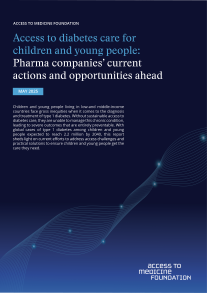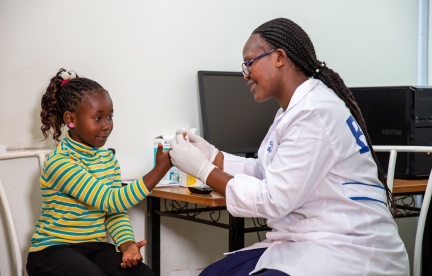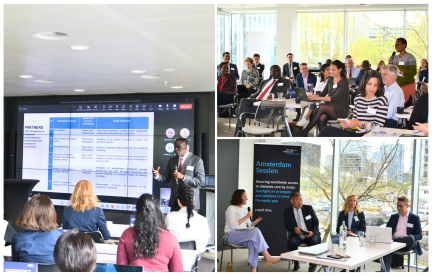Foundation's new report narrows in on critical gaps in diabetes care faced by children and young people – identifying opportunities for pharma to scale access
Report analyses 11 company-backed initiatives providing diabetes care to children and young people (CYP) living with type 1 diabetes (T1D); for many CYP these initiatives remain the only way to access treatment.
Initiatives are varyingly supported by the world’s three largest insulin manufacturers – Eli Lilly and Company, Novo Nordisk and Sanofi – as well as biosimilar producer Biocon Limited through the donation of insulin and delivery devices and financial contributions.
While the initiatives operate in more than 50% of the low- and middle-income countries (LMICs) covered in the report, a small fraction of CYP in these regions are being reached.
Report sets out practical solutions to bridge major gaps sustainably, including how pharmaceutical companies can address the affordability of diabetes products, which remains a critical access barrier.
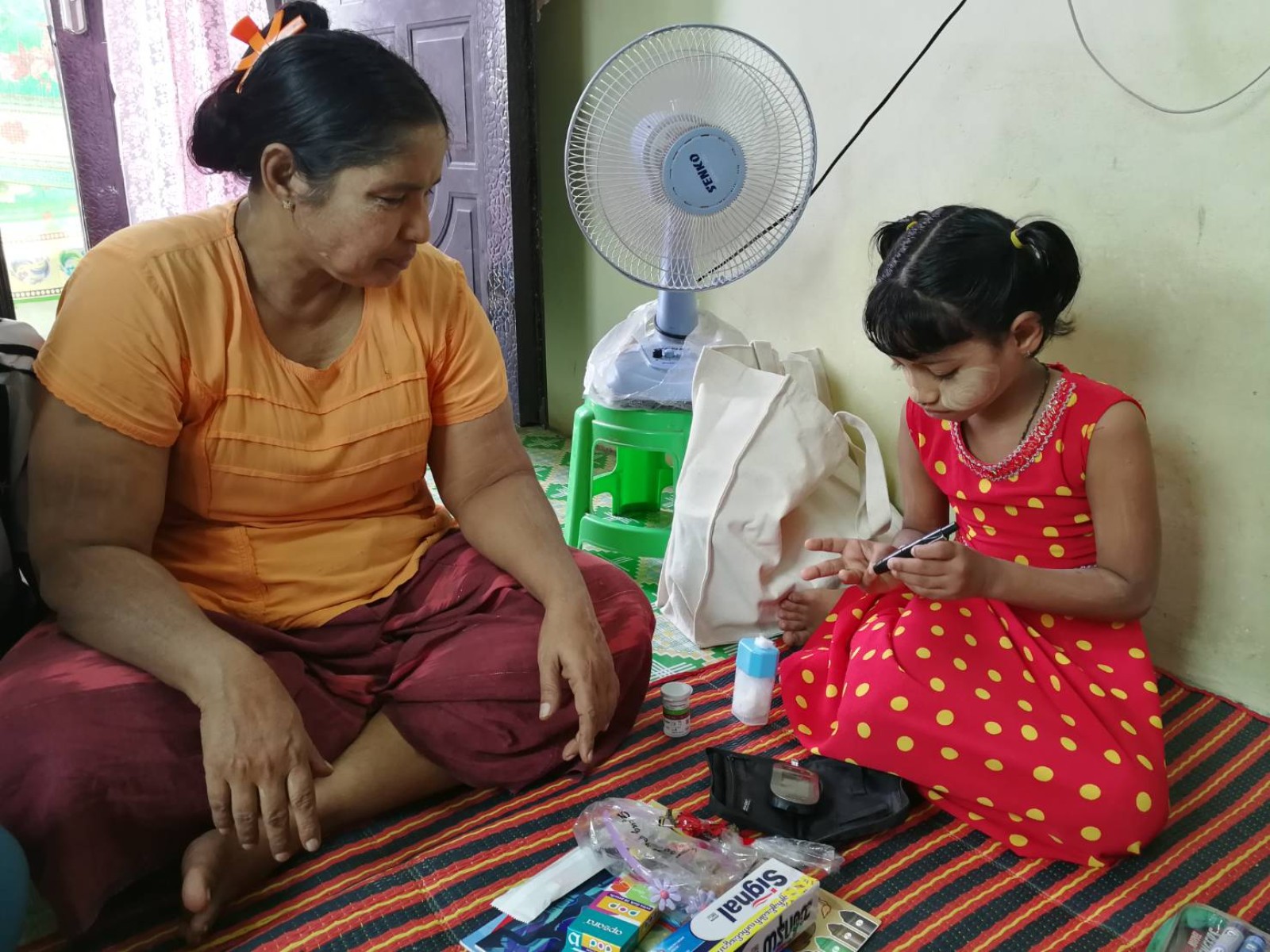
Children and young people (CYP) living in low- and middle-income countries (LMICs) face gross inequities when it comes to the diagnosis and treatment of type 1 diabetes (T1D). Without sustainable access to diabetes care, they are unable to manage this chronic condition, leading to severe outcomes that are entirely preventable. With global cases of T1D among CYP expected to reach 2.2 million by 2040, a new report from the Access to Medicine Foundation, published today, sheds light on current efforts to address access challenges and practical solutions to ensure CYP get the care they need.

The report analyses 11 initiatives that have been specifically established to provide diabetes care for CYP, which are varyingly backed by major insulin producers Lilly, Novo Nordisk and Sanofi, as well as biosimilar insulin manufacturer Biocon. These four companies offer diverse portfolios of insulins and delivery devices, all of which are crucial for managing T1D effectively. Together, their strength in the market and unique portfolios position them to redefine access to essential products for millions worldwide.
While each of these four companies are also undertaking broader commercial initiatives and access strategies to expand the availability and affordability of diabetes care in LMICs, the needs of CYP living with T1D are particularly complex. Children especially face unique challenges, and they often require, specific, tailored support to effectively manage this chronic condition. For this reason, it is essential to look at dedicated initiatives targeting CYP apart from broader diabetes care programmes to determine where gaps persist and develop actionable solutions.
4 companies, 11 initiatives, 71 countries
Collectively, these 11 initiatives operate in 71 of the 113 LMICs that are included in the Foundation’s analysis. However, they are largely sustained by donations and are reaching a limited number of CYP living with T1D in these regions through the provision of diabetes-related products.
Five main findings highlight positive developments in expanding access to diabetes care for CYP living with T1D in LMICs while also identifying critical areas of improvement for companies moving forward.
5 main findings
While over 50% of LMICs in scope are being covered by company-supported initiatives, only a limited number of CYP are being reached across these countries. This represents impressive coverage, and the initiatives are offering critical support by supplying a range of products and delivery devices, but many CYP in LMICs – both in the countries not covered and even in those that are – still lack access to diabetes care. Only a small fraction (less than 10%) of the estimated 833,000 CYP in need of T1D care living in the 71 LMICs collectively covered by the initiatives were reached in 2023, for example.
Three companies are taking steps to broaden the types of products they provide to initiatives, including the provision of insulin analogues and pens in certain LMICs. Companies’ diabetes care initiatives in LMICs have historically focused on providing human insulin in vials. But as the standard of care has evolved over time, companies that supply or donate insulin to these initiatives have started to offer a broader range of products. For instance, Biocon, Lilly and Novo Nordisk now provide insulin analogues as well as insulin pens through at least one CYP-focused initiative. Partnerships with device manufacturers have also made some diabetes monitoring tools more accessible via these initiatives in certain regions. However, these changes are still relatively new, and only a small number of CYP have access to these products so far.
All four companies contribute to capacity building initiatives – including educational efforts – within the CYP-focused initiatives they support. Most initiatives backed by these companies integrate multiple elements of capacity building to help the diverse needs of CYP with T1D and their families, ensuring more comprehensive support. Sanofi’s KiDS stands out as the only programme educating not just children and families, but also teachers and school staff. Notably, Lilly and Novo Nordisk support investments in infrastructure and equipment, ensuring CYP have better access to care in areas where resources have long been limited.
All four companies provide donations to at least one of the 11 initiatives, which can pose risks to the long-term certainty of an initiative. While these contributions are meaningful and vital to the success of the initiatives, the heavy reliance on donations from industry partners creates long-term uncertainty; the lives of CYP depend on these initiatives, and any reduction or withdrawal of support could result in a sudden loss of access to critical products for hundreds of thousands of CYP. Compounding this issue, ten of the 11 initiatives have set end dates or specific goals, with several scheduled to conclude by or before 2030. While this does not necessarily mean they will end, it underscores the uncertainty of sustained access.
CYP's access to long-term, affordable diabetes care remains a critical challenge. To ensure continuity of care for CYP living with T1D in LMICs, Lilly and Novo Nordisk are backing initiatives that are working to adapt initiative models to better align with local needs and are collaborating with partners to transition T1D care towards government ownership. Notably, although still in the early stages of implementation, Lilly and Life for a Child are working on improving the continuity of care for young people who age out of initiatives by extending age eligibility for support in specific countries. Despite these developments, efforts to scale and sustain access to diabetes care will not be futureproof if the issue of cost is not addressed.
Next steps - scaling access for CYP living with T1D
CYP are receiving vital support through the 11 company-backed initiatives that bridge gaps in access to treatment, monitoring devices, essential supplies and diabetes education, while also strengthening local healthcare systems in LMICs. However, despite their meaningful impact, the reality is that these programmes alone cannot support CYP who remain in desperate need of diabetes care.
Today, insulin remains out of reach for half of those who need it, meaning that for many CYP living with T1D in low- resource settings, diabetes care is not about effective management but mere survival. Even when they do gain access to treatment, it often falls below the standard of care offered elsewhere, highlighting stark disparities.
Companies have the power to change this. The recommendations in the Foundation’s report provide practical solutions whereby companies can bring about the fundamental shift that is required to truly scale up access and reach CYP with unmet needs. This includes ensuring that the diabetes treatments and technologies best suited to CYP are available where they are needed most; moving away from the donation-based models that largely define current efforts to support CYP; and addressing affordability and product availability to help facilitate the successful transition to government owned T1D care in LMICs. This way, all CYP, regardless of where they live, can have access to lifesaving diabetes care products.
Bringing the report’s findings to stakeholders at the World Health Assembly
The Helmsley Charitable Trust and the Access to Medicine Foundation convened a side event during the 2025 World Health Assembly in Geneva. The event took place on 21 May and centered around “Unlocking Access to Insulin: Advancing Public-Private Partnerships for Equitable Diabetes Care”. It brought together more than 100 leaders from across sectors to examine what it will take to close the access gap.
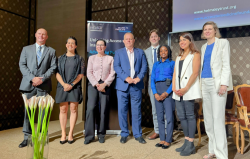
Unlocking Access to Insulin: Industry and Global Leaders Discuss Solutions on the Sidelines of the 78th World Health Assembly
Read moreCross-sector Research
Learn more about our Diabetes Care Programme
